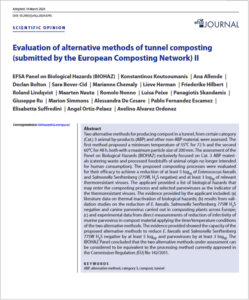In 2023 the European Compost Network ECN submitted two alternative methods for the treatment of animal by-products such as kitchen waste from households, canteens and restaurants, in tunnel composting for the authorisation in accordance with Article 20 of the Animal By-Product (ABP) Regulation (EC) No 1069/2009. The European Food Safety Authority (EFSA) has now published its scientific opinion on these two alternative methods of tunnel composting. It was concluded that these methods are as effective as the current treatment standard for kitchen and catering waste under the ABP Regulation meaning 70 °C for 1 h 12 mm.
 ECN proposed two alternative time-temperature profiles to comply with the ABP Regulations. In practice, this means a lower temperature (55°C or 60°C) during the hygienisation phase and taking into account that the particle size of catering/kitchen waste constituents may be larger than 12mm. These conditions are realistic for composting systems operating to convert biowaste (catering/kitchen waste) into compost.
ECN proposed two alternative time-temperature profiles to comply with the ABP Regulations. In practice, this means a lower temperature (55°C or 60°C) during the hygienisation phase and taking into account that the particle size of catering/kitchen waste constituents may be larger than 12mm. These conditions are realistic for composting systems operating to convert biowaste (catering/kitchen waste) into compost.
The proposed new standards
The following two standards have been proposed for the composting of catering waste and processed foods, including kitchen waste from households:
Standard 1:
- maximum particle size of ABP before entering the tunnel: 200 mm;
- minimum temperature in all material in the tunnel unit: 55°C; and
- minimum exposure time in the tunnel unit without interruption: 72 hours
Standard 2:
- maximum particle size of ABP before entering the tunnel: 200 mm;
- minimum temperature in all material in the tunnel unit: 60°C; and
- minimum exposure time in the tunnel unit without interruption: 48 hours
As the EU Fertilising Products Regulation (EC) 2019/ only recognises the EU animal by-products transformation standard of 70°C for at least 1 hour with a maximum particle size of 12 mm for all types of animal by-products (ABPs) destined for composting, no compost derived from catering waste will be certified as an EU fertilising product under this regulation, creating a significant barrier to transboundary acceptance and trade.
Therefore, the effect of lower temperature and larger particle size on pathogen inactivation and overall risk reduction was evaluated in the application submitted by ECN. It was demonstrated that the proposed composting processes were effective in achieving a reduction of at least 5 log10 of Enterococcus faecalis and Salmonella Senftenberg (775W, H2S negative) and at least 3 log10 of relevant thermoresistant viruses.
''The EFSA Panel on Biological Hazards (BIOHAZ) concluded ‘that the two alternative methods under assessment can be considered to be equivalent to the processing method currently approved in the Commission Regulation (EU) No 142/2011.''
It is now up to the Commission to take measures to authorise these two methods as standard transformation parameters in the ABPs Regulation.
